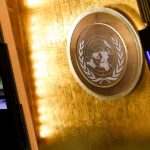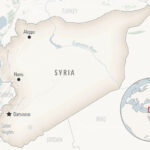
UNITED NATIONS (AP) — Russia is asking the U.N. Security Council to establish a commission to investigate its claims that the United States and Ukraine are violating the convention prohibiting the use of biological weapons as a result of activities being carried out at biological laboratories in Ukraine.
A draft resolution circulated to council members and obtained Tuesday by The Associated Press states that under Article VI of the convention Russia has filed an official complaint alleging that banned biological activities are taking place in Ukraine.
Soon after Russia’s Feb. 24 invasion of Ukraine, its U.N. Ambassador Vassily Nebenzia claimed that secret American labs in Ukraine were engaged in biological warfare — a charge denied by the United States and Ukraine.
The draft resolution would authorize the Security Council to set up a commission consisting of its 15 members to investigate the Russian claims and report to the council by Nov. 30 and to parties to the convention at a review conference in Geneva from Nov. 28-Dec. 16.
Nebenzia said in a letter that it was circulating the resolution, along with some 300 pages of material, ahead of a Security Council meeting Moscow has called for Thursday on biological activities in Ukraine. He said Russia also plans to hold consultations of council experts on the draft resolution.
In March, U.S. Ambassador Linda Thomas-Greenfield accused Russia of using a Security Council meeting for “lying and spreading disinformation” about biological weapons as part of a potential false-flag operation by Moscow for the use of chemical or biological agents in Ukraine.
The U.S. Mission to the United Nations did not have an immediate comment on the Russian draft resolution.
An AP investigation in March found that Russia’s baseless claims about secret American biological warfare labs in Ukraine were taking root online including in the United States, uniting COVID-19 conspiracy theorists, QAnon adherents and some supporters of ex-President Donald Trump — despite rebuttals from independent scientists, Ukrainian leaders and officials at the White House and Pentagon.
Ukraine does have a network of biological labs that have gotten funding and research support from the U.S. But they are owned and operated by Ukraine and are part of an initiative called the Biological Threat Reduction Program that aims to reduce the likelihood of deadly outbreaks, whether natural or manmade. The U.S. efforts date back to work in the 1990s to dismantle the former Soviet Union’s program for weapons of mass destruction.
“The labs are not secret,” Filippa Lentzos, a senior lecturer in science and international security at King’s College London, said in an email to The Associated Press in March. “They are not being used in relation to bioweapons. This is all disinformation.”
Nebenzia claimed in the letter to council members circulated Tuesday that during what Russia calls its “special military operation” in Ukraine it obtained “a variety of documents and evidence that shed light on the true nature of military biological activities of the U.S. and Ukraine on the Ukrainian territory.”
“The data analysis gives evidence of non-compliance by the American and Ukrainian sides with the provisions” of the biological weapons convention, he said.
Nebenzia said Russia attempted “to obtain exhaustive answers” to questions on specific U.S. and Ukrainian activities and implementation of the convention, but “Washington and Kyiv have not provided necessary explanations, nor have they taken immediate measures to remedy the situation.”
He said a formal meeting of the 197 state parties to the convention was called by Russia in late August and early September on the activities at biological laboratories in Ukraine, but a final report said “it was not possible to reach consensus on the questions we raised.”
The questions “remain open and require resolution,” Nebenzia said, which is why Russia is invoking Article VI of the convention. It gives state parties the right to request that the Security Council investigate alleged breaches.
The draft resolution also notes that Article VI requires state parties “to cooperate in carrying out any investigation which the Security Council may initiate.”




